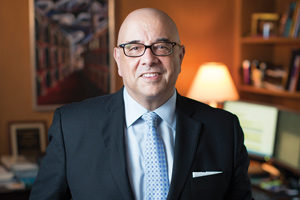Greetings From Northwestern Engineering
A message from Dean Ottino

This summer, the University announced a major investment in Computer Science. Recognizing that the field has become a foundational discipline for many of our students, and that faculty across departments are increasingly using computational thinking in their own disciplines, the University will hire an additional 20 Computer Science faculty members in the coming years. The goal is to not only advance Computer Science at Northwestern, but advance Northwestern through Computer Science.
What is perhaps most interesting is that half of the new faculty members will be in core Computer Science areas and half in collaborative CS+X appointments with other disciplines. We are currently developing the strategic framework, and the possibilities are endless. Computer Science has the potential to connect and amplify nearly every field at the University. We look forward to recruiting the best collaborative computer scientists to help make this happen, and we will keep you updated on our progress.
The goal is to not only advance Computer Science at Northwestern, but advance Northwestern through Computer Science.
In recent years, our Computer Science faculty members have connected more with our Department of Industrial Engineering and Management Sciences (IEMS) faculty members. IEMS has considerable strength in optimization and machine learning. The Center for Optimization and Statistical Learning will create new research connections and leverage optimization principles in areas as varied as search engines, power grids, and organ donations. I hope you will read more about this field.
This fall, we welcomed new faculty member John Rogers, a bioelectronics pioneer whose bendable, flexible electronics can be integrated within the human body.
His work has the potential to change the fields of industrial and consumer electronics. He will lead the new Center for Bio-Integrated Electronics in the Simpson Querrey Institute for BioNanotechnology.
Our work in biomedical technology extends to the developing world through our Center for Innovation in Global Health Technologies (CIGHT). For more than a decade, the Center has worked to develop low-cost, easy-to-use tests for HIV, tuberculosis, and hepatitis C. With corporate partners and through the Northwestern Global Health Foundation, CIGHT researchers have worked to bring these tests to market through nonprofits. They hope to help solve one of our most pressing problems by giving patients in developing countries access to better healthcare.
Finally, I hope you will read about several of our interdisciplinary student projects in our Ideas at the Intersection feature. These are just a few examples of the projects we highlight on the website (ideas.northwestern.edu) that show the wealth of innovations that happen when students come together across fields through courses, student groups, and self-assembled teams.
As always, I welcome your feedback.
Julio M. Ottino
Dean, McCormick School of Engineering and Applied Science
